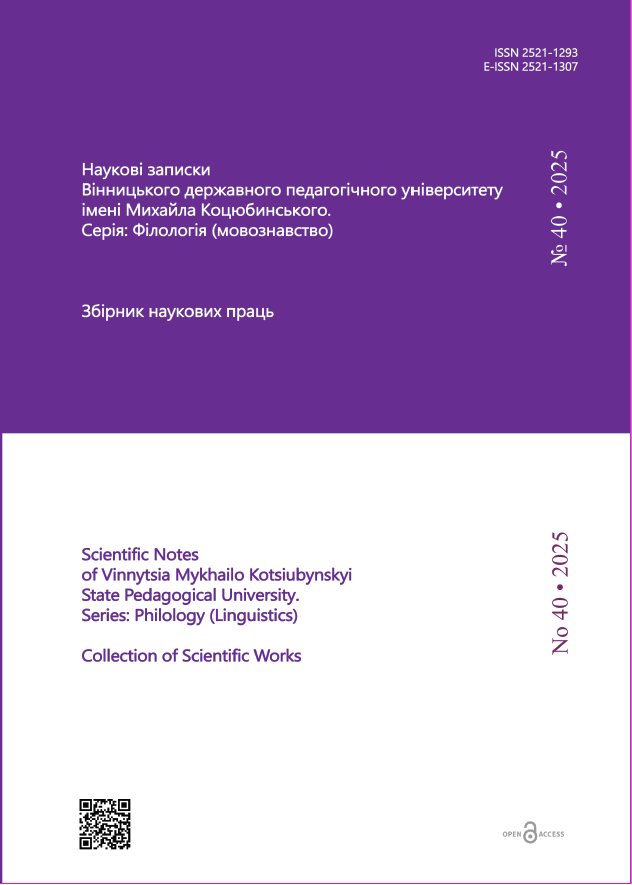Normativeness of ukrainian political blogotext (based on the material of Sergii Sternenko's blog)
DOI:
https://doi.org/10.31652/2521-1307-2025-40-10Keywords:
political blog, language norm, linguopragmatics, normativity, non-normative, language culture, precedent phenomenonAbstract
This article presents an analysis of the most frequent errors in Ukrainian political blogotexts, grounded in the posts of the political blogger, civic activist, and volunteer Serhii Sternenko across the social networks Facebook, Instagram, Telegram, and X. Particular attention is devoted to fragments of his online texts that exhibit linguistic deviations and that yield linguo-pragmatic effects or have already become exemplars of precedent phenomena. The selection of a politically oriented blogger is justified by the increased popularity of political blogging in Ukraine since the onset of the full-scale invasion. Overall, the opinion leader demonstrates considerable linguistic competence in text production; nevertheless, his posts contain errors at various linguistic levels. These inaccuracies may result from the time constraints of composing posts, lack of familiarity with specific language norms, or deliberate use of non-standard lexis or constructions for particular communicative aims. The most prevalent are grammatical errors: incorrect noun declension in the genitive case when used with numerals two, three, and four; the use of comparative rather than superlative adjective forms; erroneous formation of the future tense; employment of active present participles; incorrect noun endings in the genitive case; reliance on constructions with passive‐voice verbs followed by nouns in the instrumental case; incorrect formation of toponymic adjectives; improper suffixation for professional designations; and neglect of the vocative case. Additionally, lexical errors occur, including paronym confusion and the use of Russicisms and calqued constructions. Orthographic errors include violations of the “rule of nine,” incorrect spelling of compound nouns and adjectives, and erroneous spelling of proper nouns. Punctuation errors manifest as omitted dashes between the subject and compound nominal predicate, missing commas around parenthetical words, and omitted commas between clauses in complex sentences. Failure to observe the principles of euphony in Ukrainian is also common in Sternenko’s publications. Given that his audience primarily consists of young people, it is important for this opinion leader to maintain high standards of public discourse and to encourage his followers to do the same.
References
Бабій, І. (2020). Українська блогосфера як відображення соціокультурних процесів. Зб. наук. праць за матер. Всеукр наук-практ. конф з міжнародною участю „Тоталітаризм як система знищення національної пам’яті” (м. Львів, 11–12 червня 2020 р.), Львів, с. 16–19.
Гусєва, А. С. (2013). Комунікативна подія в межах інтернет-блога: прагматичні типи висловлень. Вісник Донецького національного університету. Сер. Б : Гуманітарні науки, № 1/2 (1), с. 68–74. URL:http://nbuv.gov.ua/UJRN/vdnug_2013_1-2%281%29__12 (06.03.2025).
Євтушина, Т. О., Затворницька, В. Ю. (2016). Прецедентні феномени політичного дискурсу (на прикладі промов Петра Порошенка). Вісник ОНУ. Сер.: Філологія, т. 21, вип. 2 (14).
Жигаліна, О. О. (2009). Блог як гіпержанр інтернет-комунікації. Психолінгвістика, вип. 4, с. 210–216. URL:http://nbuv.gov.ua/UJRN/psling_2009_4_28 (06.03.2025).
Зайцева, С. В., Левун, Н. В. (2016). Мовні особливості української блогосфери. Український смисл, 2016, с. 278–290. URL:http://nbuv.gov.ua/UJRN/Usmysl_2016_2016_31 (02.03.2025).
Полумисна, О. О. (2014). Прецедентні феномени в публікаціях інтернет-видання "Українська правда". Діалог: медіа-студії, вип. 18/19, с. 434–441. URL: http://nbuv.gov.ua/UJRN/dialog_2014_18-19_45 (25.02.2025).
Прігунов, О. В. Станіславенко, А. В. (2004). Вплив лідерів думок медіапростору на світогляд та мовну культуру українського суспільства. Теоретичні і прикладні аспекти інформаційної, бібліотечної та архівної справи. (Лист), с. 68–79.
Сучасна політична лексика : енциклопед. словник-довідник (2015) / [І. Я. Вдовичин, Л. Я. Угрин, Г. В. Шипунов та ін.]; за ред. Н. М. Хоми. Львів : Новий Світ-2000, 396 с.
Сюта, Г. М. (2023). Лінгвософія опозиції «свій – чужий» у текстах періоду російсько-української війни. Українська мова, №2, с. 3–34. https://doi.org/ 10.15407/ukrmova2023.02.003
Сюта, Г. М. (2019). Прецедентні висловлення в сучасній українській політичній риториці. Культура слова, вип. 90, с. 120–131. URL:http://nbuv.gov.ua/UJRN/Kuls_2019_90_13. DOI: https://doi.org/10.37919/0201-419X-2019.90.11
Сюта, Г. М. (2022). Тексти війни: ситуативно маркована анормативність і нові акценти норми. Матеріали ІІ Міжнар. славістичної конф., присв. Пам’яті св. Кирила і Мефодія. Харків, с. 179–187.
Чемеркін, С. Г. (2009). Українська мова в Інтернеті: позамовні та внутрішньоструктурні процеси. Київ, 240 с. URL: https://iul-nasu.org.ua/wp-content/uploads/2021/04/chemerkin-s.pdf (06.03.2025).









